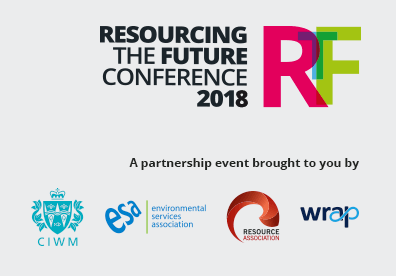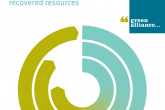Five things we learned at Resourcing the Future 2018
 The great and good of the waste and resources industry once again congregated in London for two days of enlightening and engaging discussion and debate on a variety of hot topics, including the future of waste and resources strategy, moving beyond weight-based recycling measurements, marine litter solutions, the UK Plastics Pact and changing export markets for waste. Here are some of our headline takeaways.
The great and good of the waste and resources industry once again congregated in London for two days of enlightening and engaging discussion and debate on a variety of hot topics, including the future of waste and resources strategy, moving beyond weight-based recycling measurements, marine litter solutions, the UK Plastics Pact and changing export markets for waste. Here are some of our headline takeaways.
Defra warns not to put all eggs in the extended producer responsibility basket
During a conference packed full of talking points and timely contributions from stakeholders across the resources and waste sector, a note of caution was espoused right from the off in the keynote speech on Day One from Shaun Gallagher, Director of Environmental Quality at the Department for Environment, Food and Rural Affairs. Gallagher reminded attendees that extended producer responsibility (EPR) was not the answer to all of the UK’s waste problems, and its introduction must form part of a holistic, cross-sector approach to waste and resources policy.
Gallagher, who was standing in for Resources Minister Therese Coffey MP during her recovery from a period of ill-health, began his keynote address by stating his belief that “solid waste management is the forgotten utility service underpinning modern society” and thanking the industry for its years of work in pushing to get the issue of waste on the news agenda, culminating in the watershed moment of David Attenborough’s Blue Planet II, which appears to have precipitated a seismic shift in public attitudes to plastic waste.
Gallagher detailed what the government and Defra have been doing in terms of resources and waste, noting the cross-departmental character of publications such as the Clean Growth Strategy, the Industrial Strategy White Paper, the Government Office for Science Report and the government’s flagship 25 Year Environment Plan, with waste and resources featuring prominently in all.
Praising industry leadership on the subject, Gallagher stated that very often “industry can go faster than legislation” and highlighted the recent UK Plastics Pact and action by groups such as the Waste and Resources Action Programme (WRAP) and the Industry Council for Packaging and the Environment (INCPEN) as examples of industry taking the lead and driving policy.

Gallagher did warn, however, that EPR, at the heart of many of the audience’s questions, was not a “magic answer to everything” and that the strategy would have to take a whole system approach, while he also appeared to rule out an energy-from-waste tax and variable charges for household waste.
Beyond weight: aligning recycling with environmental outcomes
Another topic on the agenda was that of recycling targets and whether they need to be overhauled and focused on environmental outcomes, as well as what needs to be done to move up the waste hierarchy.
The second full session of Day One, chaired by Claire Brailsford of the National Association of Waste Disposal Officers (NAWDO), sought to tackle these issues in light of the new targets set by the EU’s Circular Economy Package (CEP) of 60 per cent recycling by 2030, which the UK has ratified but will likely struggle to achieve – given it is already unlikely to reach the 50 per cent recycling rate target for 2020.
As Jacob Hayler, Executive Director of the Environmental Services Association (ESA), said, policy on recycling needs to be ambitious, as “current policy delivers current outcomes”. If the UK is serious about hitting its recycling targets and moving up the waste hierarchy, serious thought needs to go into what environmental outcomes the UK wants to see and how recycling can contribute to that, as opposed to recycling for the sake of it.
On the matter of moving beyond weight-based targets, Simon Hann, Life Cycle Assessment Specialist at Eunomia Research and Consulting, and Iain Gulland, Chief Executive of Zero Waste Scotland, explored the prospects of moving to a carbon-based system, with Gulland in particular demonstrating Scotland’s carbon metric. Hann made the point that weight-based targets can leading to “gaming” of the system by focusing on heavier materials, or materials that are easier to collect in high quantities, even if collecting these materials does not have the highest environmental impact, leading to a skewing of the benefit of recycling. Eunomia has already started to apply a carbon metric to local authority recycling performance through its Carbon Recycling Index.
Marine litter expert says ‘plastic is not the enemy’
Day Two of the conference opened with a slightly different perspective: that of a marine biologist, Professor Richard Thompson, Head of the International Marine Litter Research Unit at the University of Plymouth. Thompson’s keynote address focused strongly on plastic, which makes up 75 per cent of all litter, and stated: “The problem’s arisen on land, and the solution is on land.”

However, Thompson was keen to make it clear that he doesn’t see the plastic problem as a black and white issue, acknowledging the many benefits plastic brings to our everyday lives. “Plastic is not one thing, it’s many things,” he stated, adding: “In my view, it’s not plastics that are the enemy… The challenge is to keep the benefits that we want without the negative impacts.”
The idea of a quick fix for plastic waste is appealing, and recent news of potential EU-wide bans on some single-use plastic, as well as plans for similar measures in the UK nations, shows one approach to the issue that is gaining momentum. With 40 per cent of plastic produced destined for single-use applications, bans could have a dramatic effect. According to Thompson, however, the solution is “absolutely not about moving to a plastic-free aisle”, referring to a popular campaign to cut plastic waste in supermarkets. Instead, he said, we need to focus on designing plastic products for the end-of-life stage, to ensure they can be better recycled while still benefiting from their helpful properties.
Ultimately, Thompson left the audience with the takeaway that there is “no single solution” to the problem. To improve the current situation we need to ensure we make the most of the unprecedented public awareness and policy interest in this most pressing of issues.
UK Plastics Pact needs legislative underpinning
The UK Plastics Pact, the voluntary agreement signed by businesses across the plastics value chain, was a hot topic throughout Day Two of RTF18, with many speakers stating the need for government intervention to go alongside the commitments made by industry. Ray Georgeson, Chief Executive of the Resource Association, called for stronger regulation to combat plastic waste, asking: “How deep is the government’s rejuvenated attitude in this area? Will it run to legislation? Voluntary agreements will not do it on their own.”
"The turtle with a straw through its nose is a market failure. The whale with 80 plastic bags in its stomach is a market failure... We cannot allow this to continue" @raygeorgeson calls for stronger regulation to tackle plastic waste #RTF18
— Resource Media (@resource_media) June 14, 2018
Support remained widespread for the Plastics Pact, with Dr Forbes McDougall, Veolia’s head of circular economy, praising its targets and timelines – including 70 per cent recycling of plastic packaging and 30 per cent recycled content by 2025 – as “more aggressive” than those in the government’s 25 Year Environment Plan. McDougall said that although the Pact is not a nationwide commitment, “it’s a demonstration that there are companies out there willing to put their necks on the line.”
He voiced concerns – echoed around the room – that the government’s own goals are too vague, focusing on that pesky phrase, ‘avoidable plastic waste’, which the panel – including Chris Preston, Deputy Director for Waste and Recycling at Defra – struggled to define.
While Preston would not be drawn on the vague nature of the government’s terms, he did acknowledge that it could play a key part in underpinning the “challenging objectives” of the Plastics Pact, stating that there is “a role for government to try and stimulate UK-based recycling facilities” through measures like reform of the packaging waste producer responsibility system.
Changing markets for waste
A panel of speakers in the afternoon drew our attention to the changing market for waste exports in the wake of China’s stricter import measures, which sent ripples through the UK recycling industry.
WRAP economist Peter Sainsbury showed how plastic exports to China from the UK have plummeted since July 2017 in comparison to the previous year, while exports to Vietnam, Malaysia and Turkey have seen an associated boom – leading these countries to begin introducing tighter restrictions on the quality of imported waste.
Interestingly, the panel discussed how a number of these growing export destinations are not using the plastic domestically but are exporting pellets to China, often with Chinese investment – the country has effectively outsourced the recycling of the waste but is still receiving a lot of the plastic to feed its high demand for recycled polymers, a system Wade Schuetzeberg of ACN Europe termed “production by proxy”.
The future of markets for waste remains “more a list of questions than predictions”, Sainsbury said, and Schuetzeberg added that he foresees “a lot of administration and logistical challenges” to come – but improving quality remains central to all these discussions.
Also at RTF18, think tank Green Alliance launched its new report into pull measures for secondary materials markets in the UK. You can read more about this report in our article.







